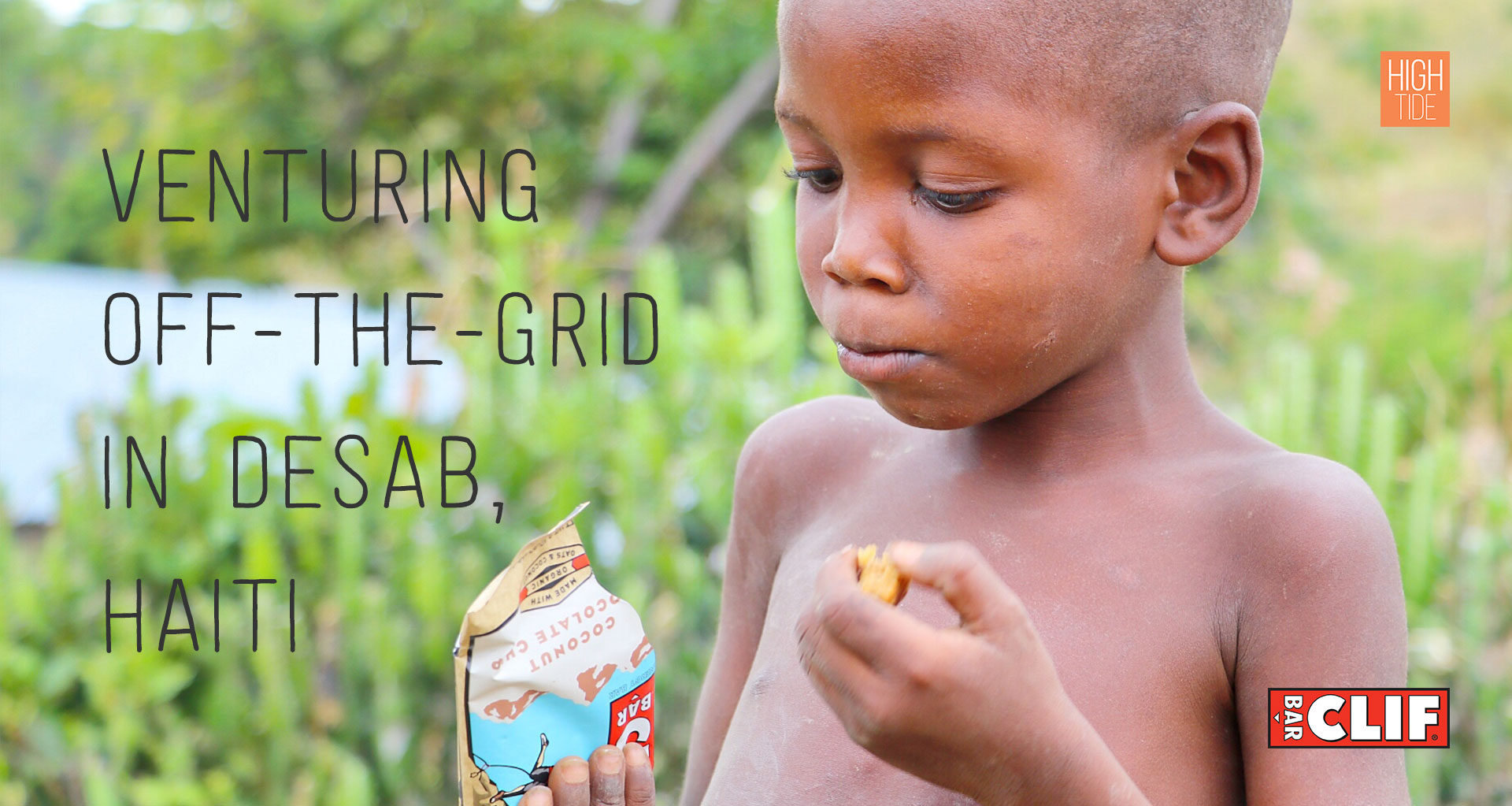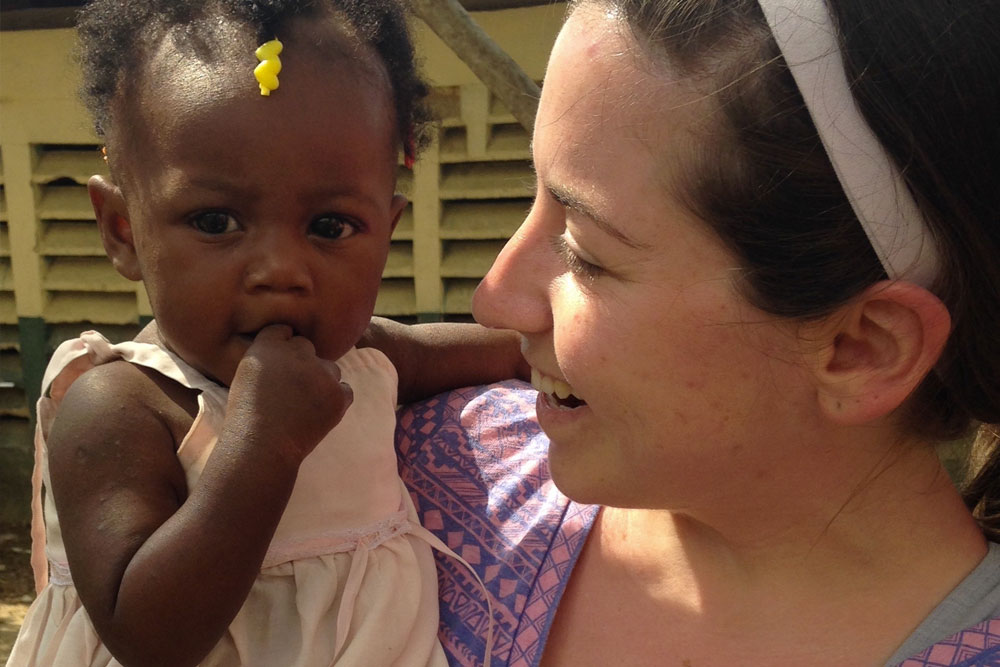WHERE THE JOURNEY BEGAN
My initial interest in visiting Haiti was sparked by the pure curiosity of learning about a place you can’t find on any map. Friends and founders of the non-profit High Tide Adventure, Bethany and Tucker Green, had been doing work in the off-the-grid community of Desab for more than a year.
Actually, after Bethany’s first trip there, she even wrote a guest post on Explore Inspired about how her experience in Haiti taught her how to travel with purpose. That’s the only reason I knew about the place. But when I Googled it earlier this Fall, very little came up outside of the Explore Inspired article and a few other posts from past volunteers.
I had to go and see for myself.
I got in touch with Clif Bar, told them about my upcoming trip, and explained some of the needs of Desab that Bethany had filled me in on. The one that stood out to me was simple. Nutrition.
The citizens of Desab suffer from nutritional deficiencies due to both lack of food in general, and the lack of variety in their diet. The dietary staples are rice, cornmeal, and various types of grains and beans that grow in the mountains. They are a farming village that subsists on what they farm. However, due to the shorter term effects of natural disasters, and the longer term impacts of climate change, farming is becoming more and more difficult. Each season is dryer than the last. The rains are less, the soil is arid, and the crop yields are small.
My aim was to explore this village that Google Maps didn’t know about and to give a small but meaningful pre-Christmas gift in the form of 500 Clif Bars. It was December 14, 2016, and I boarded my flight to Haiti.
AFTER ARRIVAL
My man on the ground in Haiti would be Fenel Jean. Fenel was born and raised in Desab, but was one of the fortunate ones who was able to receive a secondary and collegiate level education, travel to the States, learn to communicate and work with volunteer organizations, all with the goal of bringing support back to Haiti. And since 2003, he has been acting Principal of the primary school in Desab.
For the children of the community, he is a role model and example of what you can become if you get an education and work hard. For the community as a whole, his work as a mediator and project lead with international support groups is the sole reason any progress has been made in the form of a clinic, school, or water and power initiative.
Fenel lives with his wife and two children on the foothills of the mountains that he used to call home. And from the town of Cabaret, he travels via dirt road nearly 2 hours each day to work within Desab. After meeting his family, we hop back in the 4×4 SUV he had rented for the weekend and we head into the mountains.
My days in Desab consisted of hiking and learning about the farms, spending time getting to know the families and the children of Desab, trekking over an hour to the gorgeous waterfall and river that is a life source for so many, attending church services, one of which was even a wedding that Fenel was the Best Man for, befriending the stray puppies with a feast of Milk Bones, and of course evading the tarantulas next to my tent.
After immersing myself into the community as much as I could in my few days there, I learned that the changing climate was affecting far more than the farm yields and it made complete sense why.
THE LINK BETWEEN EDUCATIONAL OPPORTUNITY & CLIMATE CHANGE
The key to creating a better Desab is education. Currently, children can attend school within Desab until the 8th grade, at which point they can either stay in the community and work the farm, or they can leave Desab for Cabaret or another city to receive secondary education. In order for a child to have the chance to leave though, their family must have the means to support themselves and that child in the absence of their assistance on the farm. The average family makes less than $100/year and this, is not in the cards for most.
Let’s trace the issue backward.
- A child can’t receive secondary education because their family doesn’t have the financial means and needs the help on the farm.
- The family doesn’t have the financial means because the farms are not producing as they once were and the 6, 7, 10 children they had to assist on the farm, are now too many mouths to feed without food.
- The farms are yielding less because the planting seasons have shifted, the farmers are not educated to know how to adapt to the changes, and there is less and less rainfall. While climate change decreases the number of storms, it increases the intensity of storms.
- January 12, 2010. The earthquake. 220,000 deaths. Over 300,000 injured. 3.5 million affected. People still sleep under tarps and have not moved back to the cities because they do not trust cement structures anymore.
- October 4, 2016. Hurricane Matthew. More than 1,000 dead and 1.4 million in need of humanitarian assistance.
It all comes back to climate change. And then from there it goes back to education. It’s a vicious circle.
While there are so many educational needs, from general studies including math, language, and history, to foreign languages, and all the way to family planning and beyond, the environment is where my focus typically lies and where I saw the most dramatic example of unknowing.
On one hand, the people of Desab would talk to me about the effects of climate change and understand the larger impacts of the issue, then on the other they would throw the wrapper for the Clif Bar I just gave them on the ground. It’s hard to blame them and I’ve seen this before throughout South and Central America. When you don’t know where your next meal is coming from, you simply don’t put the time and resources into waste management and removal.
One afternoon, I had a group of kids come around and clean up all the plastic in the courtyard with me, and I did my best to explain why. But the purpose of this trip was more to be an observer of culture than to grandstand against their way of life in the limited time I had to spend there.
Rather than lecture, I tried to lead by example and provide a small lesson in the payoffs of hard, mindful, work. By the end of my stay, they were bringing me Clif Bar wrappers without asking for anything in return. Just to show me they cleaned up and to get a high five!
TAKING STEPS FORWARD
Unfortunately, due to years upon of years of well-intentioned people and organizations attempting to help, Haiti has become a hand-out culture of created dependencies where people expect others to come in and take care of them. To give them what they need. And they are certainly not shy about asking for it!
Fenel, inspiring in his every moment, is very focused on making sure the children of Desab learn a new way. To create a community that doesn’t rely solely on outside support, but that can confidently care for itself.
From our conversations, I realize he and Bethany have the same long-term vision for Desab. That one day, we may visit not as volunteers, but as friends. Simply to spend the time together, and enjoy a quiet life in a beautiful place with so much potential to become something great.
“Behind the mountain, there are mountains.”
It will always be an uphill battle for the people of Desab and Haiti on the whole, but they are not giving up, nor should we. The country may face bigger problems on the scale of political corruption and lack of any central coordination or collaboration from the government, but that’s no reason to sit back and say that you can’t make a difference.
I’m more of a step by step guy myself. That’s the only way to make it to the top of a mountain anyway.



